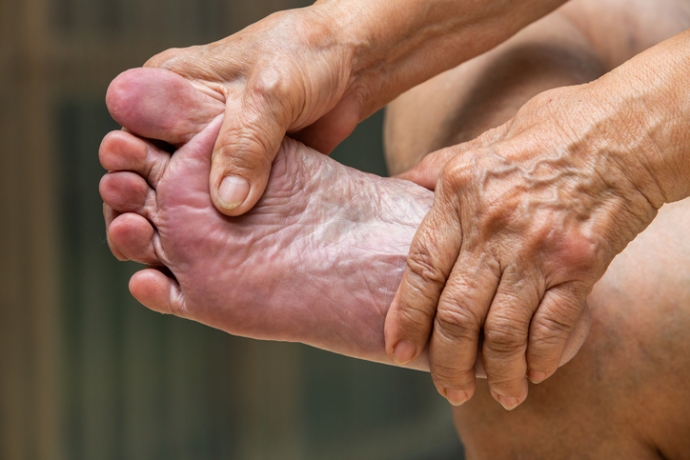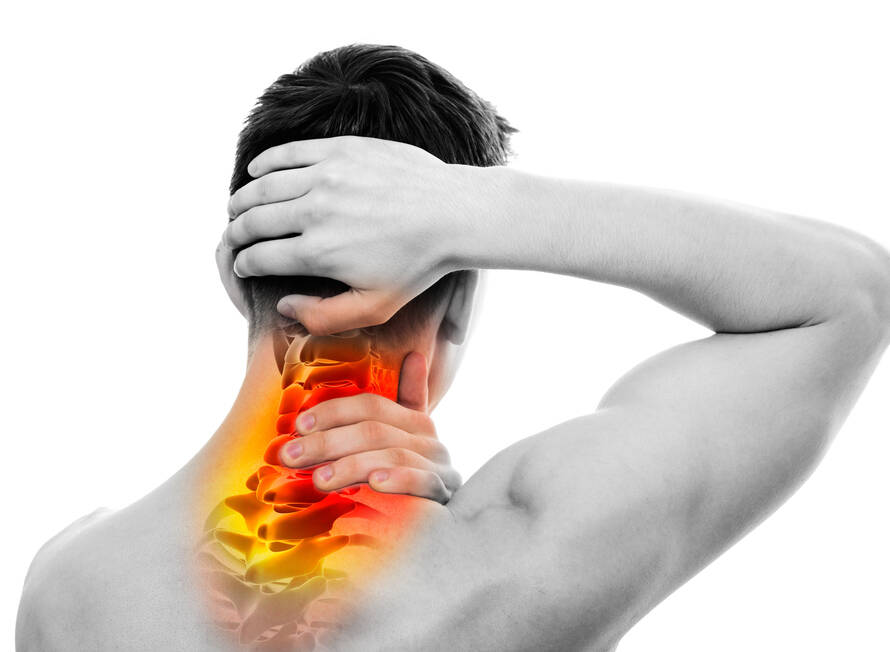Muscle pain is a tender, throbbing pain with sensation of soreness & stiffness. It can also include muscle spasms and cramps. Muscle pain gets better when the area is exercised as the movement helps to release toxins and lactic acid that have built up inside.
Cause & Management
- Overuse, strain or injury to a specific muscle while performing activity
Over usage or repetitive muscle activity without any variation due to exercise / work can cause pain to a specific muscle. When beginning any physical activity start with proper warm up and progressively increase the intensity to allow the muscles to adapt. End the exercise with cool down and hydrate yourself after workout. If sitting for extended periods, take regular breaks and do stretches. Maintain proper posture at all times. - Chronic stress & anxiety
Psychological or physical stress can lead to muscle tension which is the body’s automatic reflex to guard against injury and pain. Sudden stress may cause muscles to tense up but once the stress passes, the tension is released. In chronic stress, muscles may remain in a near constant state of tension, leading to pain. Learning and practicing relaxation techniques, breathing exercises and taking part in adequate physical activity can improve how one deals with stress or chronic pain and in turn reduce its negative effects on muscles. - Electrolyte Imbalance
Electrolytes like calcium (Ca), magnesium (Mg), potassium (K) and sodium (Na) are needed for energy production, muscle contraction & relaxation & conduction of nerve impulses. Shortage or imbalance of electrolytes can slow muscle contractions causing cramping, weakness, fatigue and pain.
Differentiating symptoms for deficiency of different electrolytes
| Magnesium Deficiency | Calcium deficiency | Potassium deficiency |
Sodium deficiency |
| Cramps during evening & in sleep | Cramps during daytime | Constipation | Nausea |
| Reduced appetite | Pain in thighs, arms esp. underarms while walking | Abdominal bloating | Vomiting |
| Nausea | Numbness / tingling in hands, feet, arms, legs, around mouth | Excessive thirst | Headache |
| Vomiting | Hair Loss | Increased urination | Irritability |
| Tiredness after exercise | Weak & brittle nails | ||
| May cause Ca & K deficiency | Dry, itchy skin |
Correcting Electrolyte Imbalance
| Electrolyte | Food sources | Supplements |
| Magnesium (Mg) Males – 340 mg /d Females – 310 mg/d |
Cereal -Whole wheat flour, quinoa, brown rice GLV – Spinach, broccoli Pulses -White chana, whole moong, Nuts & Seeds -Peanut, pumpkin seeds, sunflower, chia, flax seeds almond, cashew Dried Fruits – Prunes |
Aspartate, citrate, lactate, and chloride forms are better absorbed. Take small individual doses over the course of the day. Avoid taking calcium supplement two hours before or after eating Mg supplement. |
| Calcium (Ca) 1000-1200 mg /d |
Dairy – Milk, curd, cheese, paneer GLV – Methi leaves Nuts & Seeds -Chia seeds, almonds, dry coconut, sunflower seeds, poppy seeds, sesame seeds Others – Moringa, cauliflower greens, curry leaves |
Don’t take more than 500 mg at a time. Calcium carbonate – to be taken with food.. Calcium citrate to can be taken with or without food. Taking Vit D supplement can increase Ca absorption. |
| Potassium (K) 3510 mg/d |
Bananas, oranges, melon, apricots, dried fruits, such as prunes, raisins, and date, spinach, broccoli, potatoes, sweet potatoes, mushrooms, peas, cucumbers, zucchini, pumpkins, leafy greens | Take in small doses with food several times a day rather than in a single large dose as can irritate GI tract. |
Medical Condition
Hypothyroid
Deficiency of thyroid hormone reduces the ability to produce, store and use glycogen in times of need, causing muscle aches, tenderness and stiffness. Weakness is seen in the muscles that are closest to the centre of the body, such as the thigh or shoulder. This can lead to problems while climbing stairs, combing hair and getting up from cross legged position. In addition to this, there is an elevation in creatinine kinase which is a muscle enzyme that increases with a muscle injury.
Peripheral Arterial Disease
Fatty blockages in the vessels that carry blood from the heart to the legs can lead to pain in the legs from exertion, such as walking- that is relieved after resting. Symptoms of pain, ache or cramps from walking can occur in the buttocks, hips, thighs or calves. Other symptoms include skin that is cool to the touch, decreased or no pulse in the feet, non-healing sores in the legs or feet and cold or numb toes. People diagnosed with this condition are recommended to walk more frequently, stop smoking and reduce saturated fats in the diet.
Prescription Medication
- Medications used to treat high cholesterol – can cause flu like ache and muscle pain. These medicines reduce coenzyme Q10 which is needed for energy production. Q10 supplement may be considered.
- Medications Used to Treat High Blood Pressure – Diuretics can reduce body’s potassium levels leading to weakness, leg cramps or fatigue. Use of potassium-sparing diuretics is advised.
- Opiates – Long-term use of opiates suppress the body’s natural painkilling functions making the body more sensitive to pain after its effect wears off.
Lifestyle management for muscle pain
- Follow a healthy lifestyle that includes a routine exercise regimen or physical activity to suit your health. Perform gentle stretches in the morning, warm up before exercising and stretch after.
- Maintain regular activity levels and avoid sudden increase in exercise intensity. Any changes should be made slowly. Avoid overusing same set of muscles; adjust work station or furniture and equipment at home to suit your needs. Be aware of your posture and stay aligned when at work. Learn when to stop and take rest, without overusing your muscles.
- Aim to maintain an ideal weight with correct body composition. Make gradual changes in diet and activity levels to remain fit and healthy.
- Try to relax, as stress can add to muscle tension and worsen muscle pain. Take breaks from work, indulge in hobbies, practice stress management techniques, yoga and meditation. Breathing exercises can help to provide relaxation and improved blood circulation.
- Consume a balanced diet according to your health status. Drink plenty of water to keep yourself well hydrated. Consume fresh fruits and vegetables to get a natural boost of minerals and vitamins. Consume whole grain foods & adequate proteins to build strong muscles.



